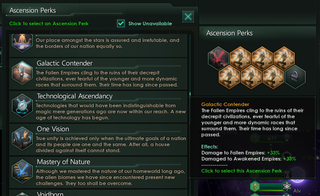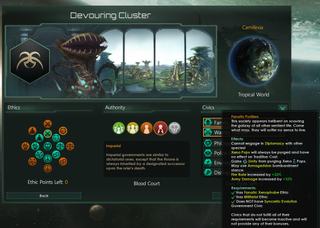The first major expansion for Stellaris, Utopia, is only a month away, and it may be the biggest and most transformative piece of DLC that Paradox Development Studio has ever released for any of its grand strategy games. Along with the accompanying 'Banks' patch (free to existing owners), we’re in for overhauls to the ethics, factions, and unrest systems, Tradition trees that allow us to further shape our empires over time, the chance to build space wonders (including entirely new planets), and late game 'ascension paths' that allow you to, for instance, turn all of your people into robots. Every Jim, Bob, and Xelgthrana is buzzing with gossip about these new features, so I’ve broken them down below—along with some speculation on how the galaxy will be affected.
Ethics, Factions, and Unrest (free patch feature)
What's new: Rather than deviating semi-randomly, different ethics (say, Militarism) will have an attraction value that determines how likely the people in your empire are to adopt them. The official ones you pick for your government will get a bonus to attraction, especially if you took the fanatical version. Factions will tend to organize around a specific ethic (such as a Human Supremacy faction for xenophobes), which will exert pressure based on their membership numbers to get you to pass policies they like. If a faction is unhappy with the government, its people will become unhappy, generating a new modifier called unrest (reducing resource output and potentially spawning rebellions) on the planets where they live.
Implications: The good news is, your governing ethics will be far less ‘locked-in’ for the duration of a campaign than they used to be. The bad news is, all your people know this and will constantly be pestering you to represent their wishes, as pesky citizens who don’t even know what it’s like to run a galactic empire are wont to do.

Traditions (free patch feature)
What’s new: Empires will now generate a new resource called Unity from building certain structures and taking certain actions. These can be spent on Traditions (costing less for smaller, more homogenous empires and those that maintain lower levels of internal unrest), which are similar to the social policy trees in Civilization 5. Each follows a common theme: Supremacy gives you more space ships and bigger laser beams to strap onto them. Prosperity helps you turn Space Resources and Space Labor into more sweet, sweet, space cash.
Implications: Increasing tradition cost from unhappy pops will help cohesive and pleasant empires who don’t exploit or enslave their citizens better compete with ruthless, sprawling ones who think children should be factory workers and aliens should be appetizers. Speaking of alien rights...

Species Rights (free patch feature, but more options with paid DLC)
What’s new: It’s now possible to set specific rights within your empire for every type of alien you encounter on an individual basis, from Citizenship (full citizens, non-voting, slaves, or even forced expulsion), military service, immigration rights, and even how many children they can have. With the expansion, you’ll also be able to pick from four kinds of slavery (put strong species to work, conscript the scary ones into the army, and turn the pretty ones into Space Butlers), and five kinds of purges (including processing them for food, if your single-minded space locusts are understandably more concerned with devouring flesh than making friends).
Implications: Have you ever wondered what those little furry dudes who keep sending you diplomatic insults taste like? You probably have now.
The biggest gaming news, reviews and hardware deals
Keep up to date with the most important stories and the best deals, as picked by the PC Gamer team.

Ascension Perks (paid DLC feature)
What’s new: When you complete a Tradition tree, you will unlock one of eight Ascension Perk slots, which are a way of adding powerful, permanent bonuses to your empire. These can include huge boosts to naval capacity, the ability to terraform otherwise uninhabitable worlds, and unlocking massive space wonders (see below). Most significantly, however, you may choose (though are not obligated) to spend two of your perk slots on one of three Ascension Paths: Synthetic for Materialist empires (becoming cyborgs, then eventually uploading the minds of your people into machines), Psionic for Spiritualist empires (awakening the latent psychic potential of your race and interacting with a strange, otherworldly dimension called The Warp The Shroud), and Biological (manipulating the DNA of any race in your empire to add and remove traits), which is open to any ethos and particularly suitable for Hive Minds.
Implications: For those who want it, this represents a path to a sort of endgame destiny for your species. For those who don’t… well, we’ll probably still have to find ways to deal with the implications of entirely cybernetic empires, gene-modders who want to assimilate our people into their hive mind, and the strange being in The Shroud calling itself ‘The End of the Cycle’ that some of the spiritualists have been murmuring about.

Hive Minds (paid DLC feature)
What’s new: At species creation, you can forego selecting any ethos for your species and instead choose to be a Hive Mind, a psionically-linked meta-organism that acts as one consciousness. Since your entire race possesses but a single will, mechanics like happiness, unrest, and factions are disabled. The downside? Your pops can’t survive in non-Hive Mind empires, and non-Hive Mind pops in your own (including on worlds you’ve conquered) will be automatically consumed (literally turned into food) by the swarm. This, understandably, gives you a diplomatic penalty to any non-Hive Mind empires you meet. In particular, watch out for anyone named “Ender”.
Implications: IF YOU WERE ONE OF US, WE WOULD NEED NOT EXPLAIN THE IMPLICATIONS TO YOU. THE SWARM IS ALL. YOU WILL BE CONSUMED. HEY, WHAT’S THAT ON YOUR PSEUDOPOD? HA-HA, GOTCHA. THERE WAS NOTHING. YOU HAVE BEEN DUPED BY THE SUPERIOR INTELLECT OF THE SWARM.

Megastructures (paid DLC feature)
What's new: After acquiring the proper ascension perk, you will be able to build massive structures in space. These include orbital habitats to house your population around uninhabitable planets (such as gas giants), Dyson spheres that encircle a star and harness huge amounts of energy (though they render any planets in the system cold and dead), and a sensor array that will give you limited vision over the entire galaxy. Like wonders in other 4X games, these projects take huge amounts of time and resources, and other empires will be notified that you are building them (with the exception of orbital habitats, which are a smaller investment).
Implications: With the ability to harness the energy of entire stars, it may now be possible to run the Large Pixel Collider at full power. If this is the last you hear from us, just know that we went out doing what we love. Also, the machine consciousness is probably coming for you next.
Run.

If you love big trucks, establishing trade routes, and the phrase 'post-apocalyptic survival business simulator' then I've got just the strategy RPG for you

Blizzard veteran David Kim's strategy comeback with Battle Aces is 'very personal:' 'I just can't accept... the end-all peak of RTS is StarCraft 2 and nothing can ever be better'
Most Popular

